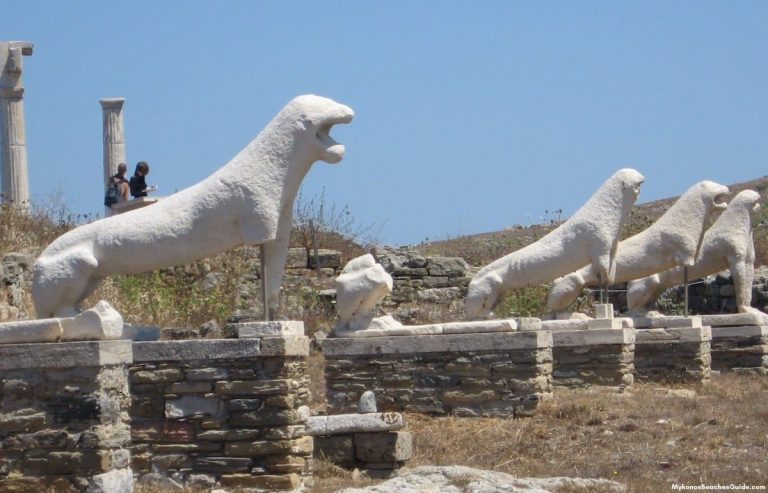
You are using the Free Edition of MykonosAPP. For extensive information on Mykonos, GO PRIME with our comprehensive Greek Travel App featuring the full editions of Mykonos and 25 more Greek islands & Athens.
Delos is a small, uninhabited island located in the Aegean Sea, just a short boat ride away from Mykonos. Despite its small size, Delos has a rich and fascinating history that has attracted visitors from around the world. In this article, we will explore the island’s history, its archaeological sites, and its significance as a religious and cultural center in ancient Greece.
History of Delos
Delos has been inhabited since the third millennium BCE, and was initially settled by the Cycladic civilization. By the seventh century BCE, it had become an important religious center, thanks to the cult of Apollo, the Greek god of music, poetry, and prophecy. According to Greek mythology, Apollo was born on the island, which further solidified its importance as a religious destination.
In the fifth century BCE, Delos became a thriving commercial hub, as it was strategically located on major trade routes between Greece, Asia Minor, and Egypt. The island’s prosperity continued for several centuries, until it was sacked by the Romans in 88 BCE. Although it never fully recovered from this attack, Delos remained an important center of religion and culture throughout the Roman and Byzantine periods.
Archaeological Sites on Delos
Today, Delos is a UNESCO World Heritage Site, and visitors can explore a number of well-preserved archaeological sites that offer a glimpse into the island’s rich history. Perhaps the most famous of these sites is the Temple of Apollo, which was constructed in the seventh century BCE and was one of the most important religious centers in ancient Greece. The temple was rebuilt several times over the centuries, and today visitors can see the remains of the temple’s columns, as well as the altar and the remains of the temple’s roof.
Another significant site on Delos is the House of Dionysus, which dates back to the second century BCE. This well-preserved house offers a fascinating look at the domestic life of the island’s ancient inhabitants, with its intricate mosaics, frescoes, and beautiful courtyards.
Other notable sites on Delos include the Agora, or marketplace, which was a bustling commercial center during the island’s heyday, and the Sanctuary of the Syrian gods, which was a religious site dedicated to the worship of the gods of Syria.
The Significance of Delos in Ancient Greece
As mentioned earlier, Delos was an important center of religion and culture in ancient Greece. The island’s cult of Apollo was particularly significant, as it was believed that the god could communicate with mortals through his priests, who were known as the Delphic Oracle. The Oracle was consulted on a wide range of issues, from matters of state to personal questions, and was considered to be one of the most important religious institutions in the ancient world.
Delos was also significant as a commercial hub, as it was strategically located on major trade routes between Greece, Asia Minor, and Egypt. The island’s merchants traded in a wide variety of goods, from wine and olive oil to spices and textiles, and the island’s prosperity was built on this thriving trade network.
Today, visitors to Delos can explore the island’s rich history and marvel at its well-preserved archaeological sites. Whether you are interested in ancient Greek religion, commerce, or domestic life, there is something for everyone on this fascinating island. If you are planning a trip to Mykonos, be sure to set aside some time to explore the nearby island of Delos – it is truly a unique and unforgettable destination.
Sorry, no records were found. Please adjust your search criteria and try again.
Sorry, unable to load the Maps API.
